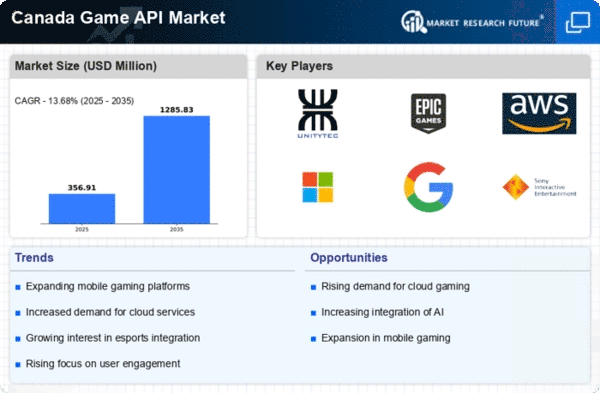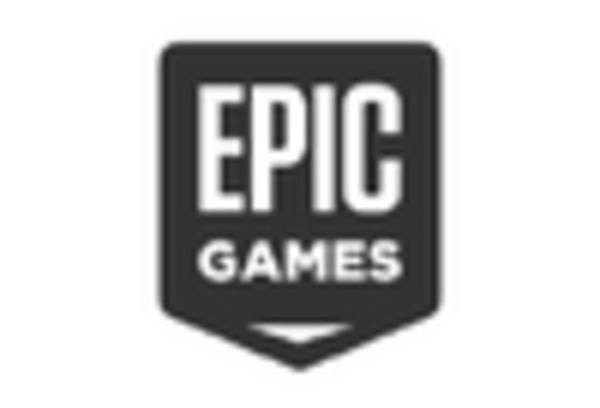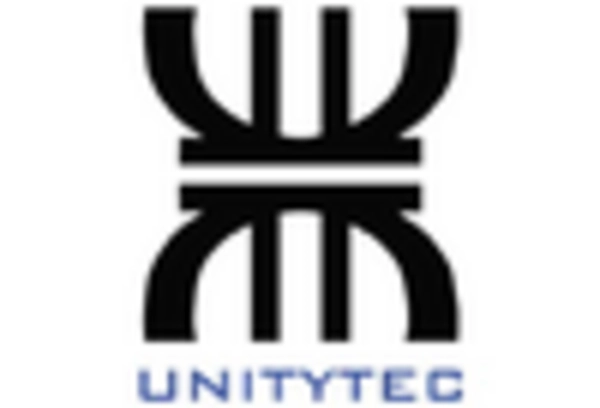Emergence of Esports
Esports has emerged as a significant driver for the Game API Market in Canada, with the industry witnessing exponential growth. The Canadian esports market is estimated to generate revenues exceeding $200 million by 2025, reflecting a burgeoning interest in competitive gaming. This growth necessitates the development of sophisticated APIs that can support live streaming, player statistics, and matchmaking services. As esports tournaments gain popularity, the demand for APIs that enhance user engagement and provide real-time data analytics is likely to increase. Consequently, companies that specialize in creating APIs tailored for esports are positioned to capitalize on this trend, thereby contributing to the overall expansion of the game api market.
Expansion of Mobile Gaming
The mobile gaming sector in Canada has experienced remarkable growth, contributing significantly to the Game API Market. With over 20 million mobile gamers in the country, the demand for APIs that facilitate seamless integration and enhance user experience is on the rise. This trend is driven by the increasing accessibility of smartphones and tablets, which has made gaming more ubiquitous. As developers seek to create engaging mobile experiences, the game api market is likely to see a surge in demand for tools that support multiplayer functionalities, in-game purchases, and social sharing features. Furthermore, the Canadian mobile gaming market is projected to reach $1.5 billion by 2026, indicating a robust opportunity for API providers to cater to this expanding audience.
Increased Focus on User Engagement
User engagement has become a critical focus for game developers in Canada, thereby impacting the Game API Market. As competition intensifies, developers are seeking APIs that enhance player retention and interaction. Features such as social sharing, in-game events, and personalized content are becoming essential components of modern gaming experiences. The Canadian gaming industry is witnessing a shift towards more interactive and community-driven games, with studies indicating that games with high user engagement can see retention rates increase by up to 30%. This trend suggests that the game api market will continue to evolve, with a growing emphasis on tools that foster deeper connections between players and the gaming environment.
Integration of Artificial Intelligence
The integration of artificial intelligence (AI) into gaming is transforming the landscape of the Game API Market in Canada. AI technologies are being utilized to create more immersive and personalized gaming experiences, which in turn drives the demand for advanced APIs. Developers are increasingly seeking APIs that can facilitate machine learning capabilities, enabling games to adapt to player behavior and preferences. This trend is particularly relevant as the Canadian gaming industry invests heavily in AI research and development, with funding reaching approximately $300 million in recent years. As AI continues to evolve, the game api market is expected to expand, offering innovative solutions that enhance gameplay and user interaction.
Growing Interest in Cross-Platform Gaming
The trend towards cross-platform gaming is significantly influencing the Game API Market in Canada. As players seek to engage with their friends across different devices, the need for APIs that enable seamless cross-platform functionality is becoming increasingly apparent. This shift is supported by the fact that over 60% of Canadian gamers express a desire for cross-platform capabilities. Consequently, game developers are prioritizing the integration of APIs that facilitate this feature, allowing for a more unified gaming experience. The rise of cross-platform gaming is likely to drive innovation within the game api market, as companies strive to create solutions that meet the evolving demands of players.
















